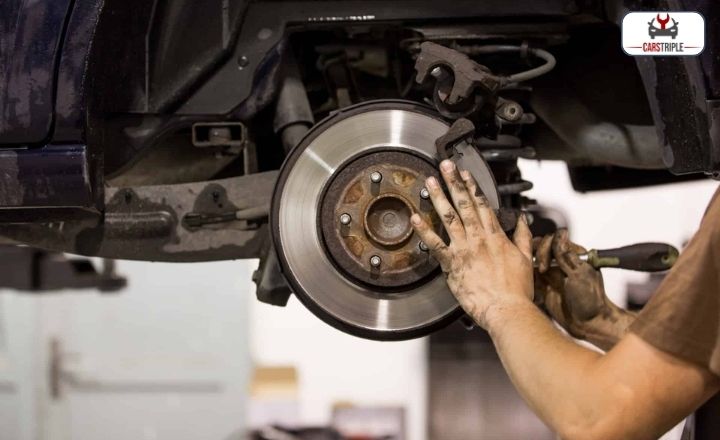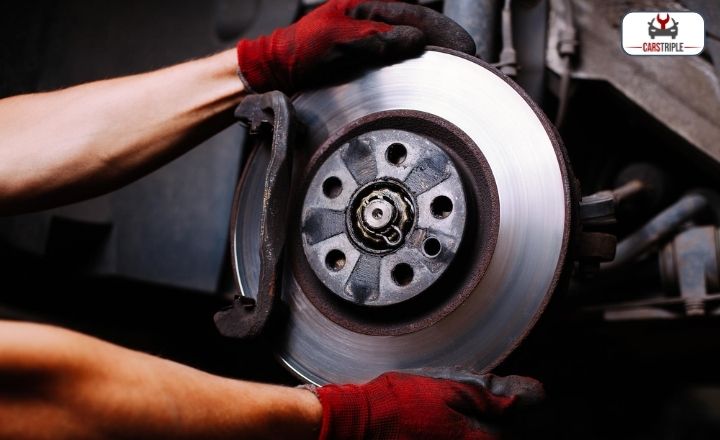The brakes allow us to stop safely in various driving conditions, preventing accidents and ensuring our peace of mind on the road. Brake lines can become worn or damaged due to corrosion or leaks.
It is essential to know about brake line replacement cost and replace them promptly to maintain optimum braking performance and help you understand what to expect when facing this maintenance task.
What Is A Brake Line, You Might Ask?
A brake line is typically made of metal or rubber tubing and connects the master cylinder under the hood to each wheel’s brake caliper or drum assembly. The purpose of this tubing is to deliver hydraulic fluid from the master cylinder to the brakes, allowing for effective braking action.
When you press down on your vehicle’s brake pedal, the braking system kicks in, applying pressure on the hydraulic fluid within the brake lines. This pressure then transfers to each wheel’s brake components.
The fluid activates the pistons inside the calipers or drums, causing them to squeeze against the rotors or drums attached to each wheel. Friction is created between these components, which slows down or completely stops the rotation of your vehicle’s wheels.
How Much Does Brake Line Replacement Cost
One crucial aspect of brake maintenance is the replacement of brake lines when they become worn or damaged. The cost of brake line replacement can vary depending on several factors, such as the make and model of your vehicle, the type of brake lines required, and where you choose to have the work done.
The average cost of replacing brake lines ranges between $100 and $300. This estimate can fluctuate significantly depending on various variables. High-end vehicles may require specialized parts that are more expensive than those used in standard car models.
If you decide to have your brakes serviced at a dealership rather than an independent repair shop, you can expect an increase in price due to higher labour rates. The subsequent chart presents the typical cost to replace brake lines on various well-liked car models.
| Vehicle | Brake Line Cost | Labor Cost |
| Dodge Dart | $6-$41 | $60-$156 |
| Ford Focus | $6-$123 | $75-$134 |
| Chevy Tahoe | $40-$151 | $105-$160 |
| BMW X3 | $31-$95 | $60-$145 |
| Chevy Silverado | $22-$190 | $85-$190 |
| Chevy Cruze | $16-$48 | $65-$154 |
| Subaru Forester | $14-$46 | $99-$145 |
| Honda Civic | $13-$189 | $106-$174 |
| Nissan Altima | $12-$57 | $75-$128 |
| Toyota Camry | $11-$37 | $92-$127 |
How Can You Identify Problems With Your Brake Lines?
Identifying any issues with your brake lines is essential to ensure your safety on the road. These lines may develop problems that can compromise their effectiveness. One common problem that may arise is fluid leakage. If you notice any puddles or drips of fluid beneath your vehicle, it could be a sign of a leaking brake line.
Brake fluid typically appears clear or slightly yellowish, but if it appears dark brown or black, it may contain contaminants due to wear and tear. Inspecting the brake lines can be beneficial, as it can help look for signs of corrosion, rust, or damage along their length.

Another indicator of potential issues with your brake lines is a spongy or soft feeling when applying pressure to the brake pedal. This could suggest air in the system was caused by a leak in one of the lines.
How Do You Know When A Brake Line Needs Replacing?
Regarding vehicle safety, having properly functioning brakes is of utmost importance. There are some crucial components of the braking system.
Low Brake Fluid Levels
One of the key indicators is a low brake fluid level. Brake fluid plays a vital role in the braking system, as it helps transfer force from the brake pedal to the brakes themselves.
When you notice that your brake fluid level is consistently low, it could indicate a leak in your brake line. It’s important not to ignore this issue, as driving with low brake fluid can significantly affect your vehicle’s ability to stop efficiently.
ABS Light Comes On
Your brake line may be due for replacement when the ABS (anti-lock braking system) light on your dashboard comes on. The ABS light illuminating can indicate various issues with your braking system, but one common cause is a fault in the brake line.
When the brake line becomes corroded or leaks, it can disrupt the hydraulic pressure required for effective braking performance. The ABS may detect irregularities and trigger the warning light as a safety measure.
Brake Pedal Feels Funny
your brake line may need replacing when you notice a funny feeling in the pedal. This could be due to various issues, such as air bubbles or leaks in the brake line.
If you experience a spongy or soft brake pedal that feels different from its usual firmness, it’s essential not to ignore it. This could indicate air trapped in the brake lines, causing reduced braking efficiency. Another possibility is a leak in the system, which can compromise your vehicle’s ability to stop safely.
Is It Possible For Me To Replace My Brake Line?
Replacing a brake line may seem daunting, but with the right tools and knowledge, it is possible to do it yourself. While this task requires some mechanical know-how, it can save money by avoiding hefty repair bills from professional mechanics.

Gathering all the necessary tools and materials is essential. You will need a flare nut wrench, a tube cutter or hacksaw, a tubing bender, new brake lines of the correct size and length for your vehicle, a double-flare tool kit or bubble-flare tool kit, depending on your vehicle’s specifications, and a fresh brake fluid.
Conclusion
Brake Line Replacement Costs can vary depending on several factors. The type and quality of the brake lines, as well as the make and model of the vehicle, can significantly impact the overall cost.
Labour costs and the repair shop’s location will also play a role in determining the final price. While it is essential to consider these factors when budgeting for brake line replacement, it is equally crucial to prioritize safety.
Faulty or worn-out brake lines can compromise your ability to stop effectively, putting yourself and others at risk. If you suspect any issues with your brake lines, it is essential to have them inspected and replaced by a professional mechanic as soon as possible.
FAQ’s
What is the most common brake line failure?
Brake lines are exposed to harsh conditions, such as road salt and moisture, which can cause the metal to deteriorate over time. This corrosion weakens the brake lines, leading to leaks or complete failure.
Can damaged or corroded brake lines be repaired?
The extent of the damage will determine whether a repair is possible or if a replacement is necessary. If the damage is minor and limited to a small area, it may be possible to repair the brake line by cutting out the damaged section and installing a new piece.
